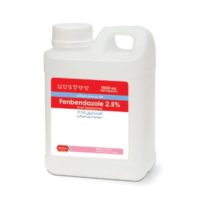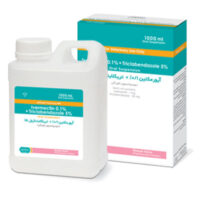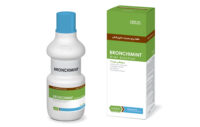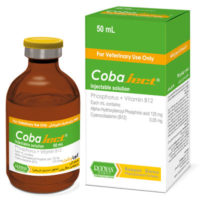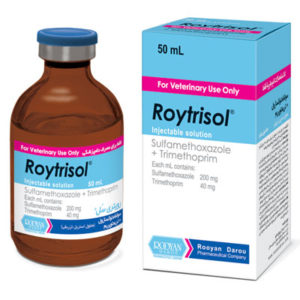
- - animals:
- - type:
- antibiotics
- - usage:
- injectable sterile solution
- - manufacturer:
- Rooyan Darou
- - Packaging:
- 50 ml vials
Product properties
Composition
Each ml contains 200 mg Sulfamethoxazole and 40 mg Trimethoprim
Pharmacology
Sulphonamides are synthetic compounds that introduced from 1930 by the use of Prontosil dye as anti-infective chemotherapeutic agent.
Most bacteria synthesize folic acid and cannot take it up preformed from the environment. In contrast, mammalian cells,use preformed folate and cannot make their own.
Sulphonamides block an early stage in folate synthesis leading to various effects, including a failure to synthesize purine nucleotides and thymidine. They are predominantly bacteriostatic but in combination with trimethoprim they become bactericidal.
Diaminopyrimidines compounds that Trimethoprim is the well known in this group inhibit dihydrofolate, the enzyme that generates tetrahydrofolate (the active form of the vitamin) from metabolically inactive dihydrofolate. Trimethoprim, the most important antibacterial agent of this type, exhibits far greater affinity for the dihydrofolate reductase of bacteria than for the corresponding mammalian enzyme: this is the basis of the selective toxicity of the compound. Since sulphonamides and trimethoprim act at different points in the same metabolic pathway, they interact synergically bacteria are inhibited by much lower concentrations of the combination than by either agent alone and the side effects will be decreased by this combination.
The most common use of trimethoprim is in the urinary tract infection and its combination with Sulfamethoxazole is effective against fungal pneumonia infection caused by pneumocystis carinii.
Indications of use
Gastrointestinal, respiratory and urinary tract infections caused by trimethoprim and sulfamethoxazole sensitive bacteria like E.coil, Haemophilus, Pasteurella, Salmonella, Staphylococus and Streptoccoccus spp. in calves, cattle, goats and sheepes.
Dosage and route of administration
For intramuscular or slow IV administration:
1 ml per 10-15 kg body weight daily for 3-5 days.
Contraindication
Hypersensitivity to trimethoprim or sulphonamides and administration to animals with a seriously renal or hepatic insufficiencies or with blood dyscrasis.
Incompabilities
The combination is incompatible with para-aminobenzoic acid and esters of it (procaine, tetracaine). Don’t administer simultaneously with hexamethylene tetramine (methenamine)
Side effects
Occasionally, temporary swellings at injection sites may occur (for this reason subcutaneous injections should be avoided).
Folic acid deficiency, crystalluria and blood dyscrasias may occur, especially if treatment is prolonged.
Withdrawal Time
Meat: 8 days
Milk: 4 days
Precautions
Discontinue using the product if any decrease in blood cells is seen.
Keep this medication out of reach of children
Storage conditions
Protect in 15-25 degree celsius and direct sun light.


